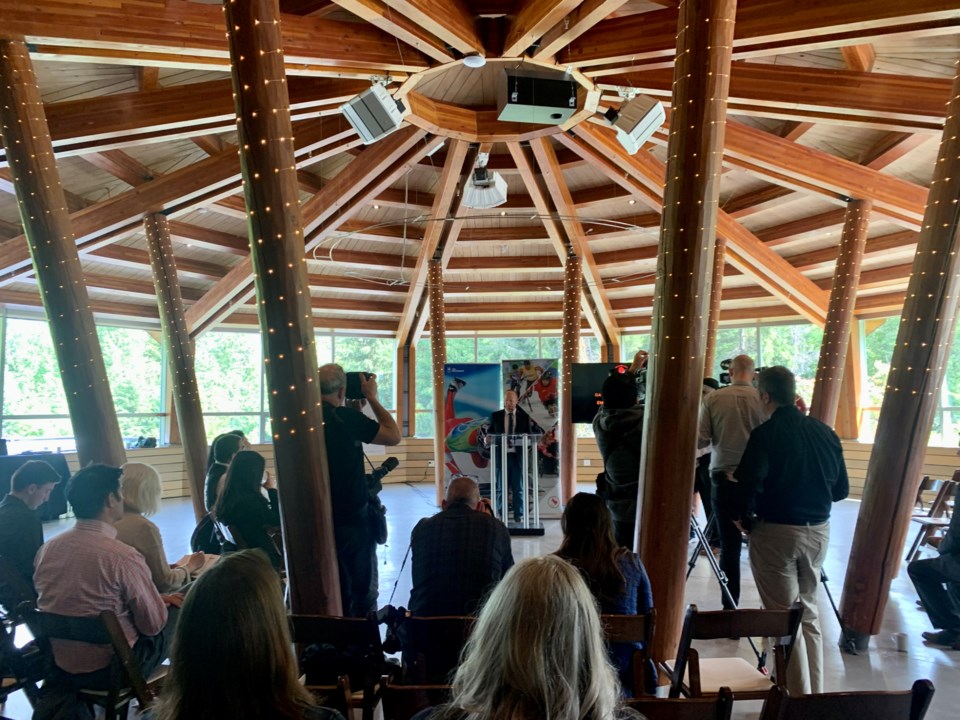Participating in an Indigenous-led effort to bring the Olympics back to B.C. is an honour Whistler Mayor Jack Crompton doesn’t take lightly.
“It has been, I would say, one of the highest privileges of my life to be in that canoe with you and to do that work,” he told representatives from the Four Host First Nations and the Canadian Olympic Committee (COC) during a meeting in Whistler on Tuesday afternoon.
“And,” Crompton continued, “I will have to be pushed out of the canoe.”
Vancouver city councillors could be the ones to deliver that nudge.
The city’s mayor and council are debating a staff report on Wednesday, July 20 before deciding whether to continue supporting a potential bid for the 2030 Winter Olympic and Paralympic Games. In the report, city staff advised councillors to hold off on making that decision until lingering questions regarding the Games’ funding model are cleared up.
But if Vancouver’s municipal government withholds its support, getting those answers might become a lot more difficult.
Whistler’s elected officials were faced with the same decision during their regular council meeting on July 19, during which councillors unanimously passed a motion to support continued work towards a potential bid.
Their endorsement came in response to a detailed presentation from Resort Municipality of Whistler (RMOW) CAO Ginny Cullen on the topic, after hearing an update from the COC’s feasibility team and representatives from the Four Host First Nations during the RMOW’s Committee of the Whole meeting earlier in the day.
The Squamish, Lil’wat, Tsleil-Waututh and Musqueam First Nations signed a Memorandum of Understanding with the RMOW and the City of Vancouver in December, before finalizing a collaboration agreement with the COC earlier this year. The feasibility team has since released a draft hosting concept that would see events split amongst Vancouver, Whistler and Sun Peaks—reusing existing venues from the 2010 Games wherever possible—and pegged the total cost to stage the event at about $4 billion. At least $1 billion would be taxpayer funded, according to initial estimates.
The team has also secured approval for proceeding with the bid exploration from the Four Host Nations, and is currently in the public engagement phase of the process. In order to keep pushing that process along, “we all have to stay in the canoe and move forward together as one,” said Squamish Nation cultural ambassador Chris Lewis on Tuesday.
Provincial, federal government support for 2030 Olympics contingent on municipal support, says COC
The International Olympic Committee plans to name the 2030 host in May 2023. As Whistler’s CAO pointed out during her presentation, Sapporo, Japan is currently B.C.’s main competitor for the Games. (Salt Lake City has also expressed interest in a bid, but U.S. officials are reportedly now eyeing the 2034 Olympics.)
“There is an indication that our bid could be an incredibly strong bid and that this is ours to lose,” Cullen told council.
But that potential bid hinges on support from higher levels of government that has yet to be offered. B.C. Minister of Tourism, Art, Culture and Sport Melanie Mark has given the COC an Aug. 15 deadline to produce a detailed financial proposal, including a breakdown of how host municipalities and First Nations would share in costs and risks.
A lack of support from the City of Vancouver could put a crack in the process before that report even crosses the minister’s desk. COC president Tricia Smith told Whistler councillors the B.C. government is only willing to back a bid if all parties responsible for paddling the canoe to this point remain on board.
“The province has said very clearly, ‘we will come to the table when we know there is support in the community, the Nations, the Resort Municipality of Whistler, the City of Vancouver … and then the federal government has told us, ‘if the province wants this, then we will come to the table,’” she explained.
As they wait to hear from the province and the feds, RMOW staff is now tasked with estimating the cost of Olympic-related essential services, conducting a financial risk assessment, and considering design and location options for an Athlete’s Village.
Directing staff to continue that work appeared to be a no-brainer for those seated around Whistler’s council table Tuesday, with most councillors taking the opportunity to list the various legacies the 2010 Olympics left behind in Whistler. As the conversation turned toward what else Whistler could gain by welcoming the world back—this time with First Nations partners at the helm—strengthened relationships was agreed to be one major benefit.
Crompton concluded Tuesday’s discussion by reading a letter addressed to Whistler and Vancouver councils and signed by the chiefs of the four Host First Nations, asking for the municipalities’ continued support and engagement in the bid exploration.
“We ask you as cities who are committed to reconciliation to continue to paddle with us,” the letter read. “Together we have the power to positively transform the country and lead the way in establishing a global model for reconciliation and partnership.”
Said Crompton, “I'm not sure there is any way our organization can say no to this invitation, and I could not receive this invite with more enthusiasm.”




